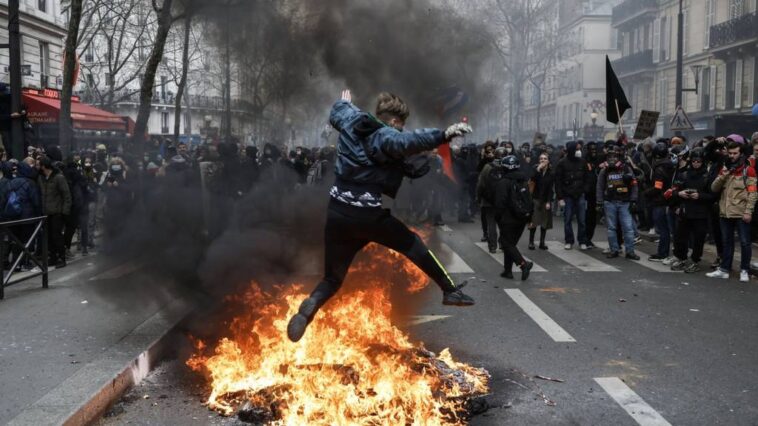Paris: Tens of thousands of French citizens took to the streets on Tuesday to demonstrate their displeasure with President Emmanuel Macron’s pension reforms, which has triggered a significant domestic crisis.
Since mid-January, unions have organized ten days of nationwide demonstrations and strikes against the law, which includes an increase in the retirement age from 62 to 64.
The movement has become a significant obstacle for Macron, who won a second term in last year’s elections, and represents the greatest crisis of his second term.
As a result of last Thursday’s most violent confrontations between demonstrators and security forces, approximately 13,000 police were deployed nationwide on Tuesday.
Both protesters and rights groups have accused the French police of using excessive force, which has fueled the wrath of demonstrators.
As the march approached Place de la Nation in eastern Paris, police discharged tear gas and launched a charge after black-clad demonstrators with their faces covered ransacked a grocery store and started a fire.
By afternoon, police reported that at least 27 persons had been apprehended in the capital.
Cast objects.
Protesters allegedly delayed trains at Gare de Lyon, one of the busiest terminals in Paris, by strolling on the tracks and lighting flares as a show of support for a railway employee who lost an eye in a previous protest.
An AFP reporter said that in the western city of Nantes, demonstrators hurled projectiles at security forces, who responded with tear gas. Along with a bank, trash cans were set ablaze throughout the city.
The police utilized water cannons in the city of Lyon in the southeast and tear gas in the city of Lille in the north after demonstrators caused damage, including the destruction of a bus stop.
The CGT union announced on Wednesday that Paris refuse collectors will end a three-week strike that has caused thousands of tonnes of garbage to accumulate in the city.
As fewer employees were striking, however, it was stated that the move was made to enable workers to “go on strike again even more forcefully.”
Nearly two weeks after Macron used a special provision to force the new pensions legislation through parliament, unions have pledged to continue mass protests until the government backs down.
King Charles III’s state visit to France, which was scheduled to commence on Sunday, was postponed due to the unrest.
Political dialogue
At the Elysee Palace on Monday, Macron convened crisis discussions with Prime Minister Elizabeth Borne, other cabinet ministers, and senior lawmakers.
Macron was quoted by a meeting participant as saying, “We must continue to extend a hand to the unions,” despite rejecting any revision of the pensions law.
Borne has scheduled meetings with members of parliament, political parties, and local authorities over the course of three weeks, and he still hopes to meet with union leaders.
The moderate CFDT union’s leader, Laurent Berger, called for the appointment of a mediator between unions and the government as “a gesture in favor of calming down and finding a solution.”
Hard-left Philippe Martinez, the head of the CGT union, stated, “The goal is the repeal” of the pensions law.
However, according to government representative Olivier Veran, the law is no longer up for debate.
“It is now in the past,” he said.
‘Nothing is changing’
The French interior ministry estimated that there were approximately 740,000 demonstrators nationwide on Tuesday, a decrease from the 1.09 million who took to the streets on Thursday.
The CGT union reported that more than two million people participated in protests, a decrease from its estimation of 3.5 million on March 23.
Tuesday’s protests were dominated by young people, with many blocking universities and secondary schools.
Jo Zeguelli, a 19-year-old student at the Sorbonne in Paris, stated, “Nothing is altering. Macron does not seem like he is listening to us.”
Also read: Transgender US Shooter Resented Attending Christian Elementary School: Cops
Paul Castagne, a 26-year-old doctoral student in ecology in Toulouse, expressed concern that the government is attempting to exploit people’s fatigue by allowing the situation to deteriorate.
Traffic on both metros and suburban trains was severely disrupted, affecting Paris’s mass transit system.
Monday, employees prevented entry to the Louvre in Paris, the most visited museum in the world, resulting in its closure.
The Eiffel Tower in Paris and the Palace of Versailles outside the city were both closed on Tuesday, as they had been on previous strike days.




